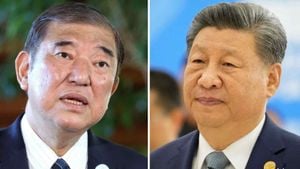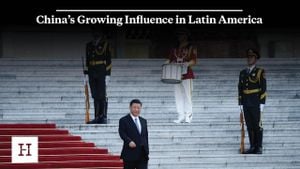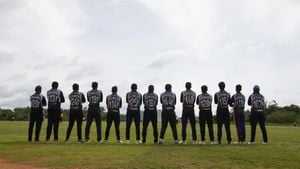Cobra Kai, Netflix’s celebrated martial arts drama, has recently returned to screens with its highly anticipated Season 6, Part 2. Continuing the legacy of the iconic Karate Kid series, this installment promises to deliver fierce competition and gripping storylines as it leads up to the series finale. With the final season divided across three parts, viewers are treated to thrilling showdowns, complex character arcs, and unexpected twists, including bloody confrontations and moral dilemmas. The spotlight this time is on the Sekai Taikai tournament held in Barcelona, bringing together dojos from across the globe for what has been described as the most prestigious karate contest of all time.
The season opens with the stakes already set high, as the Miyagi-Do students prepare for the Sekai Taikai, where they face rival dojos including the Iron Dragons, helmed by the menacing Sensei Wolf, portrayed by Lewis Tan. The atmosphere crackles with tension as old rivalries reignite, and the friendships between characters are tested through competition and adversity.
Throughout the tournament, the focus shifts between different fighters, with Robby Keene, played by Tanner Buchanan, taking the lead for the Miyagi-Do team. The action becomes intense quickly. During Robby's bout with Axel Kovacevic of the Iron Dragons, viewers are treated to choreography and fight sequences said to be some of the series' best yet. But it’s not just the matches on the mat; emotional and physical stakes intertwine, leading to clashes not just between students but also troublesome pasts as rivalries manifest.
An unexpected and shocking turn of events occurs when the friendship between Robby and Miguel Diaz, represented by Xolo Maridueña, is strained during their encounters on the mat. They must navigate not only their individual stakes but the broader ramifications of their roles within the dojo and the pressures exerted by their senseis and rival schools.
But even as viewers root for their favorite fighters, the show does not shy away from highlighting darker themes inherent within the competition, especially with the confrontation between Kwon and the upcoming showdown. Tension mounts when Kwon, who symbolizes everything Kreese has instilled - aggression and ruthlessness - finds his own path tragically cut short. The climax of the tournament results not just in victory or defeat but rather, as co-creator Jon Hurwitz noted, “leads to tragedy, reshaping every character's battle going forward.”
The harrowing moment peaks when Kwon, played by Brandon H. Lee, becomes entwined in the violence of competition, leading to his untimely death by the infamous eunjangdo knife—an act of violence unprecedented both within Cobra Kai and the Karate Kid franchise. The knife, symbolic of Kreese's philosophy, becomes instrumental not just as a weapon but as a narrative device, forcing characters and viewers alike to confront the deadly consequences of the show’s underlying “strike first, strike hard, no mercy” motto.
This pivotal moment elicits shockwaves across the remaining characters, leading to immediate repercussions as chaos ensues. The impact of Kwon’s death is felt instantly, with students and senseis alike grappling with the morality of their surroundings and the high costs of their combative lifestyles. The narrative not only grips audiences with its action sequences but also forces reflection on the learning experiences of the dojo's students.
“Kwon’s death marks the darkest point for both the tournament and the students involved,” Hurwitz explains, emphasizing the importance of this moment as one not just of tragedy but transformation. It presents Kreese, long vilified, as the architect of chaos, raising questions about his methods and motivations.
With such heavy themes at play, fans are buzzing about what lies next for the series as it moves toward its third and final installment set for release in early 2025. Co-creator Hayden Schlossberg hinted at the stormy emotional landscapes teaching characters the lessons they desperately need. “Every character has their turn to grapple with their decisions leading up to this climax, presenting not just opportunities to fight, but moments to pause and reflect,” he points out. Through all the karate and turmoil, it’s the moral cadre of these characters increasingly at risk of unraveling their identities amid alliances and betrayals.
Leading the discussions about Season 6, Part 3, fans are curious about not only the ramifications of Kwon's death but also how it will affect the eventual showdowns between long-time rivals. Characters like Samantha (Mary Mouser) and Tory (Peyton List) are expected to take center stage, potentially setting up climactic face-offs fueled by personal histories as well as karate prowess. Meanwhile, Kreese and Silver (Thomas Ian Griffith) continue to scheme, and secrets surface, promising to enthrall viewers just when they think they've seen everything.
Another point of speculation is the direction for each character’s arc as the series wraps up. With so much tension built through seasons, will the Miyagi-Do students embody the true spirit of karate—one of honor and respect—or will they succumb to the dark pathways set by Kreese and Silver?
While Cobra Kai has been acclaimed for its action sequences and character development, many fans are left pondering whether it will close plotlines satisfactorily. Can the creators weave together the narrative threads laid throughout previous five seasons, delivering both resolution and introspection, or will they leave viewers yearning for more closure?
Given the investment made by the audience over the years, the final season encapsulates feelings of nostalgia, tension, and the bittersweet pangs of farewell. One consistent theme, echoed by recurring characters such as Daniel LaRusso and Johnny Lawrence, is the timeless lesson each generation must learn about facing their past and finding their path toward the future.
So whether you’re rooting for the underdogs or the former bullies, it’s evident everyone will feel the weight of their decisions as Cobra Kai approaches its final chapter. Cobra Kai fever has not simply sparked curiosity but offers reflective possibilities about legacy, morality, and the price of ambition.
Anticipation is palpable as we await the conclusion of not just fights but the emotional journeys set for closure. Will the characters emerge as evolved individuals, with lessons learned, or remain trapped by past influences? For now, the viewer can only sit tight as Netflix streams the action-packed entries leading to what promises to be one tremendous ending.
Conclusion: The complex interplay of character evolution and martial arts will continue to captivate fans as Cobra Kai barrels toward its series finale. The lessons taught and the fights fought will resonate, leaving behind reflections on rivalry, redemption, and the very essence of martial arts philosophy.



